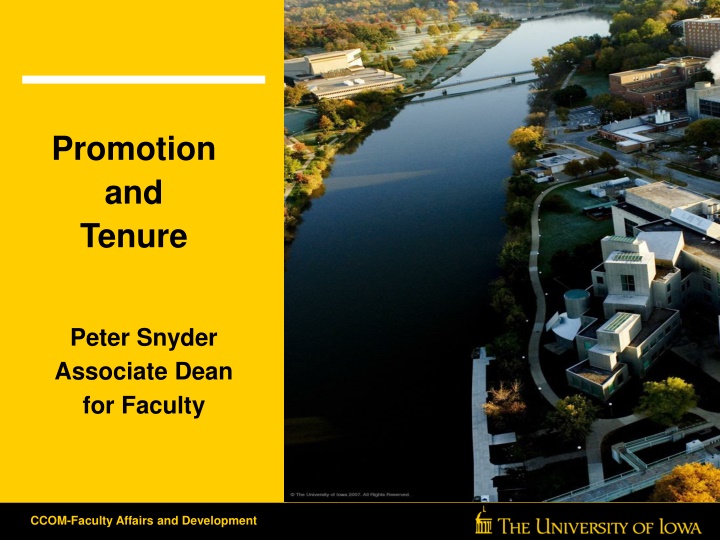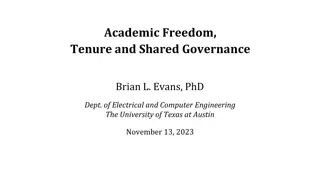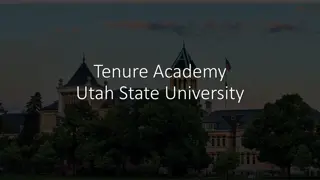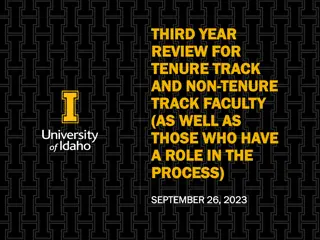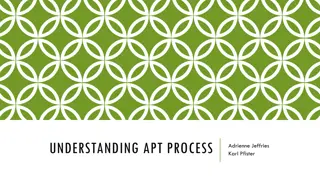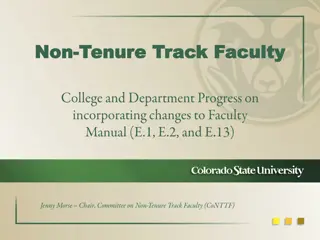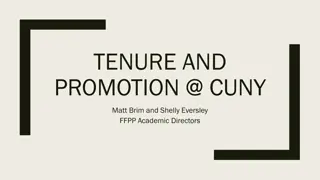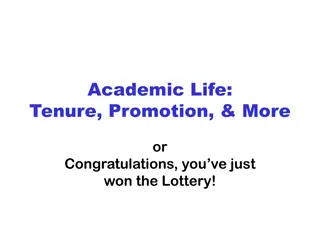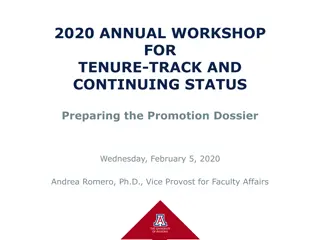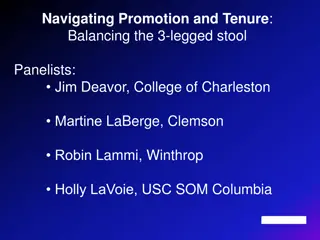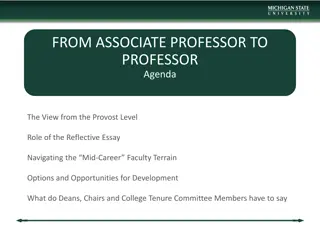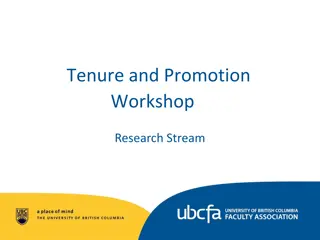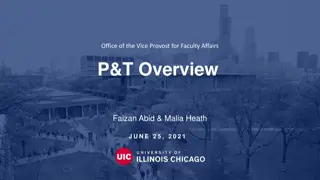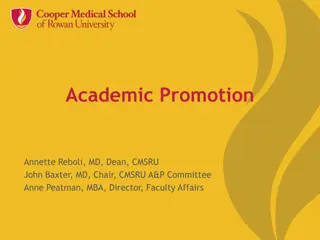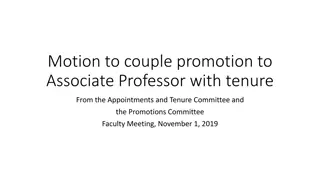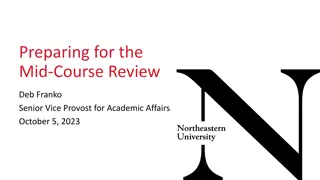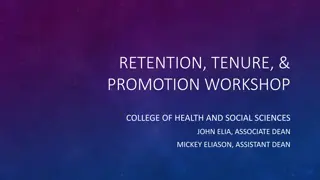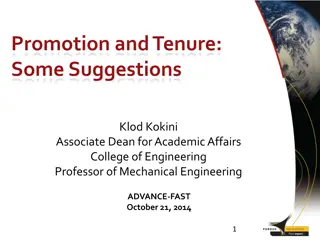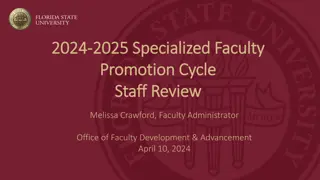Academic Promotion and Tenure Guidelines in Higher Education
Understanding the academic promotion and tenure process is crucial for faculty members in higher education. This guide covers eligibility criteria, timelines, reasons for extending tenure, expectations for promotion, research track considerations, and the definition of tenure. It highlights the importance of meeting criteria such as high-quality teaching, scholarly productivity, service contributions, and national/international reputation. The guide also clarifies the protections and responsibilities associated with earning tenure.
Download Presentation

Please find below an Image/Link to download the presentation.
The content on the website is provided AS IS for your information and personal use only. It may not be sold, licensed, or shared on other websites without obtaining consent from the author.If you encounter any issues during the download, it is possible that the publisher has removed the file from their server.
You are allowed to download the files provided on this website for personal or commercial use, subject to the condition that they are used lawfully. All files are the property of their respective owners.
The content on the website is provided AS IS for your information and personal use only. It may not be sold, licensed, or shared on other websites without obtaining consent from the author.
E N D
Presentation Transcript
Promotion and Tenure Peter Snyder Associate Dean for Faculty CCOM-Faculty Affairs and Development
When am I ready for promotion? Assistant to Associate Professor Required in the final probationary year of a tenure track appointment (year 6 or 8) Tenure Clock Associate to Full Professor Often after 6-7 years in rank but no specific time frame Other options (early promotion): higher expectations - The Department recommends - The faculty member requests review
Reasons to extend tenure clock Automatic - COVID19: 1 year for assistant professors in rank during 2020-21 academic year - Addition of minor child (1 year per child, up to 2) Need to make a request Discretionary - Extenuating circumstances that slow progress (e.g. prolonged health issues) - Requires approval from department chair, dean, and provost
What are expectations for promotion? To Associate Professor with Tenure - Evidence of high quality teaching - Establishing a record of productive scholarship - Appropriate level of academic and/or professional service - Promise of promotion to professor To Professor with Tenure - Continued evidence of high quality teaching - Established record of productive scholarship - Unmistakable national/international reputation - Appropriate level of service
Research Track No tenure clock or requirement for promotion Focus is on research/scholarship - Teaching and service not required (although will be considered if present) Not necessary to have independent funding - Should be co-investigator Unmistakable national/international reputation - For promotion to Professor
What is Tenure? Promotion to Associate Professor confers Tenure Tenure protects academic freedom - Academic freedom to pursue and publish research and to discuss course subject matter without interference (but can t introduce subject matter with no relation to the subject) Appointment length is indefinite - Post-tenure reviews (5 years) - Not a job for life. May be terminated for policy violations, failure to meet written standards, or financial exigency.
What do I need to do for promotion process? Decide whether to apply for promotion late spring Compile and submit promotion packet late summer Provide updates for new papers, grants, etc. As department and college reviews are completed, provide input as requested
Aug Promotion Materials Promotion Committees Sept-Oct Sept Vote, report Department DCG Nov Vote DEO Decision, report Executive Committee CCG Jan College Vote, report Dean Decision, report Provost Promotion Process Decision May Regents
Putting Together a Promotion Packet CV in CCOM format Personal statement (teaching, scholarship, service) Sample teaching materials - 4-5 of your best examples Learner evaluations Peer evaluations of teaching
Putting Together a Promotion Packet Publications (pdfs) - 5 most representative (best) Potential external reviewers (8-10) - Names, titles, contact info., relationship - External to UI - Above your current rank - Conflicts of interest (must not be mentor, collaborator/coauthor, friend, etc.)
CV Make sure it is up to date! CCOM format (template on CCOM OFAD website) Annotate bibliography - indicate contributions to papers where you are not first/last author (co-first, co-corresponding, middle) Indicate role on grants Indicate which talks were invited vs. submitted abstract Indicate role on committees (e.g. chair vs. member)
Personal Statement Brings your CV to life very important! Not to exceed 8 pages - Teaching: up to 3 pages - Scholarship: up to 3 pages - Service: up to 2 pages (clinical and committees/etc.) Address any issues that you think reviewers may raise Include future plans and goals
Evaluation of Teaching Classroom (lectures, small group), clinical, lab/bench Review of teaching materials - Course materials - Presentations/lectures (e.g. Powerpoint slides) - Lecture handouts Quantity relative to peers Quality relative to peers ( effective teacher ) - Learner evaluations (you need to review them!) - Peer evaluations - Teaching awards - Activities to improve teaching skills
Evaluation of Scholarship Discovery and dissemination of new knowledge - Papers Driving force behind work - Independence Funding to carry out the work - R01, VA Merit, equivalent - Some work doesn t require funding (uncommon)
Evaluation of Scholarship Quality/impact (number, journals, scope) - number depends on field, journals Focus - Clear theme, developing an area, moving field forward Independence - Authorship order, funding (PI), external reviews Sustained productivity - lack of gaps (explain any), ongoing funding National/International reputation - for promotion to professor
Evaluation of Service Internal- Department, College, University - Committees - Mentoring External - Society committees, leadership - Editorial boards, journal reviewer - Study sections, grant reviews Clinical service- if relevant
Department Process Materials gathered by faculty (Aug 1) Potential reviewer names gathered from faculty, in collaboration with chair/division director (Aug 15) - Department may add names (with faculty approval) - Letters are solicited by department (don t contact potential reviewers) Material is compiled and moved to the department review committee (Sept 15th)
Department Process Department review committee assesses teaching, scholarship, and service (September-October) Review and Vote by Department Consulting Group - All department tenure track faculty above rank Report written - faculty may review and correct factual errors DEO forwards recommendation to the college
College/University Process Materials (teaching, scholarship, service) reviewed by the CCOM Executive Committee (Nov-Jan) Executive Committee makes a recommendation to the dean Dean makes recommendation to the provost (Feb) Consideration by the Iowa Board of Regents (May) Promotion takes effect July 1
How to Get Help CCOM policies and procedures https://medicine.uiowa.edu/facultyaffairs/faculty/promotion-and-tenure Talk to leadership (DEO, division director, vice chair for faculty) Talk to mentor or recently promoted faculty Office of Faculty Affairs and Development ccom-ofad@healthcare.uiowa.edu Promotion and Tenure website https://webapps1.healthcare.uiowa.edu/PromotionTenure
